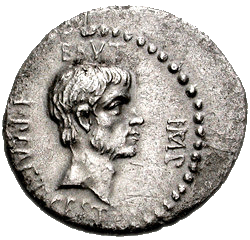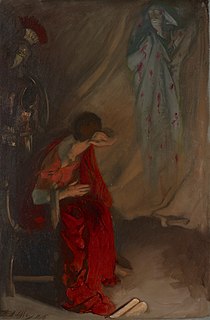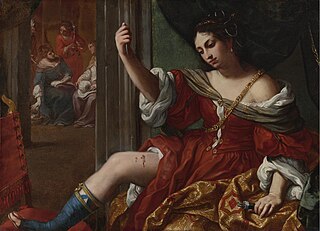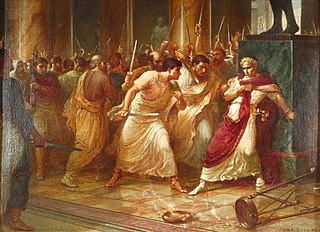Related Research Articles

Gaius Julius Caesar was a Roman general and statesman who played a critical role in the events that led to the demise of the Roman Republic and the rise of the Roman Empire.

Marcus Antonius, commonly known in English as Mark Antony or Anthony, was a Roman politician and general who played a critical role in the transformation of the Roman Republic from a constitutional republic into the autocratic Roman Empire.

Marcus Junius Brutus, often referred to simply as Brutus, was a Roman senator and the most famous of the assassins of Julius Caesar. After being adopted by an uncle, he used the name Quintus Servilius Caepio Brutus, but subsequently returned to his birth name.

The Tragedy of Julius Caesar (First Folio title: The Tragedie of Ivlivs Cæsar) is a history play and tragedy by William Shakespeare first performed in 1599. Although the play is named Julius Caesar, Brutus speaks more than four times as many lines as the title character, and the central psychological drama of the play focuses on Brutus.

The Battle of Philippi was the final battle in the Wars of the Second Triumvirate between the forces of Mark Antony and Octavian and the leaders of Julius Caesar's assassination, Brutus and Cassius in 42 BC, at Philippi in Macedonia. The Second Triumvirate declared the civil war ostensibly to avenge Julius Caesar's assassination in 44 BC, but the underlying cause was a long-brewing conflict between the so-called Optimates and the so-called Populares.

Gaius Cassius Longinus, often referred to as simply Cassius, was a Roman senator and general best known as a leading instigator of the plot to assassinate Julius Caesar on March 15, 44 BC. He was the brother-in-law of Brutus, another leader of the conspiracy. He commanded troops with Brutus during the Battle of Philippi against the combined forces of Mark Antony and Octavian, Caesar's former supporters, and committed suicide after being defeated by Mark Antony.

Sextus Pompeius Magnus Pius, also known in English as Sextus Pompey, was a Roman military leader and politician who throughout his life upheld the cause of his father, Pompey the Great, against Julius Caesar and his supporters, during the last civil wars of the Roman Republic. He formed the last organized opposition to the Second Triumvirate, in defiance of which he succeeded in establishing an independent state in Sicily for several years.

Porcia, occasionally spelled "Portia", especially in 18th-century English literature, was a Roman woman who lived in the 1st century BC. She was the daughter of Marcus Porcius Cato Uticensis and his first wife Atilia. She is best known for being the second wife of Marcus Junius Brutus, the most famous of Julius Caesar's assassins.

Publius Servilius Casca Longus was one of the assassins of Julius Caesar. He and several other senators conspired to kill him, a plan which they carried out on 15 March, 44 BC. Afterwards, Casca fought with the liberators during the Liberators' civil war. He is believed to have died by suicide after their defeat at the Battle of Philippi in 42 BC.

Et tu, Brute? is a Latin phrase literally meaning 'and you, Brutus?' or 'also you, Brutus?', often translated as 'You as well, Brutus?', 'You too, Brutus?', or 'Even you, Brutus?'. The quote appears in Act 3 Scene 1 of William Shakespeare's play Julius Caesar, where it is spoken by the Roman dictator Julius Caesar, at the moment of his assassination, to his friend Marcus Junius Brutus, upon recognizing him as one of the assassins. The first known occurrences of the phrase are said to be in two earlier Elizabethan plays; Henry VI, Part 3 by Shakespeare, and an even earlier play, Caesar Interfectus, by Richard Edes. The phrase is often used apart from the plays to signify an unexpected betrayal by a friend.

Julia was the daughter of Roman dictator Julius Caesar by his first or second wife Cornelia, and his only child from his marriages. Julia became the fourth wife of Pompey the Great and was renowned for her beauty and virtue.
Marcus Tullius Cicero Minor, or Cicero the Younger, was born in 64 or 65 BC. He was the son of Marcus Tullius Cicero, who as a distinguished orator and consular senator was one of the leading figures of the Roman Republic during the 1st century BC, and his first wife, Terentia. Cicero Minor had an elder sister, Tullia, who was born in 79 BC and died in 45 BC.
Marcus Porcius Cato, son of Cato the Younger by his first marriage to Atilia, was a Roman soldier and in his earlier years spent some time in politics with his father. Although he never achieved greatness, he was admired by close friends and relatives, and also served his father most loyally and shared his ideals. Marcus was renowned for being a man of gallantry and warm temperament.

The Liberators' civil war was started by the Second Triumvirate to avenge Julius Caesar's assassination. The war was fought by the forces of Mark Antony and Octavian against the forces of Caesar's assassins, led by Marcus Junius Brutus and Gaius Cassius Longinus, also called the Liberatores. The latter were defeated by the Triumvirs at the Battle of Philippi in October 42 BC, and committed suicide. Brutus would also commit suicide after the second part of the battle.
Marcus Junius Brutus was a tribune of the Roman Republic in 83 BC and the founder of the colony in Capua. He was an associate of Marcus Aemilius Lepidus, who led a reaction of the populares faction against the optimates after the death of Sulla. He was the father of Brutus, the assassin of Julius Caesar.

Julius Caesar, the Roman dictator, was assassinated by a group of senators on the Ides of March of 44 BC during a meeting of the Senate at the Theatre of Pompey in Rome. The senators stabbed Caesar 23 times. The senators claimed to be acting over fears that Caesar's unprecedented concentration of power during his dictatorship was undermining the Roman Republic, and presented the deed as an act of tyrannicide. At least 60 senators were party to the conspiracy, led by Marcus Brutus, Gaius Cassius and Decimus Brutus. Despite the death of Caesar, the conspirators were unable to restore the institutions of the Republic. The ramifications of the assassination led to the Liberators' civil war and ultimately to the Principate period of the Roman Empire.
Marcus Favonius was a Roman politician during the period of the fall of the Roman Republic. He is noted for his imitation of Cato the Younger, his espousal of the Cynic philosophy, and for his appearance as the Poet in William Shakespeare's play Julius Caesar.

Poems by Julius Caesar are mentioned by several sources in antiquity. None are extant.
The military campaigns of Julius Caesar constituted both the Gallic War and Caesar's civil war. The Gallic War mainly took place in what is now France. In 55 and 54 BC, he invaded Britain, although he made little headway. The Gallic War ended with complete Roman victory at the Battle of Alesia. This was followed by the civil war, during which time Caesar chased his rivals to Greece, decisively defeating them there. He then went to Egypt, where he defeated the Egyptian pharaoh and put Cleopatra on the throne. He then finished off his Roman opponents in Africa and Hispania. Once his campaigns were over, he served as Roman dictator until his assassination on March 15, 44 BC. These wars were critically important in the transition of the Roman Republic into the Roman Empire.
Gaius Servilius Casca Longus, sometimes referred to as Titiedius, was one of the assassins of Gaius Julius Caesar on 15 March, 44 BC. Afterwards, Casca fought with the liberators during the Liberators' civil war. He is believed to have died by suicide after their defeat at the Battle of Philippi in 42 B.C.
References
- ↑ Oxford Classical Dictionary , Oxford University Press, 1964, p. 954
- ↑ Plutarch, Life of Brutus, chapter 48
- ↑ Plutarch, Life of Brutus, chapter 48